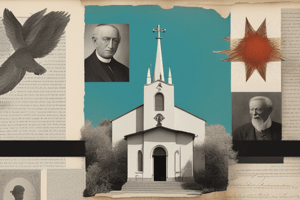Podcast
Questions and Answers
What is the primary purpose of Ecumenical Councils?
What is the primary purpose of Ecumenical Councils?
- To promote local church events
- To select new bishops
- To organize the church hierarchy
- To discuss and define significant issues of faith and morals (correct)
Which of the following describes the Ordinary Magisterium?
Which of the following describes the Ordinary Magisterium?
- The infallible teachings of the Pope alone
- A temporary assembly for urgent issues
- The ongoing teaching authority of the Pope and bishops (correct)
- The collective authority of all bishops in a council
What distinguishes dogmas from other Church teachings?
What distinguishes dogmas from other Church teachings?
- They are only applicable to specific groups.
- They can change over time.
- They are considered central to Church teaching. (correct)
- They are open to interpretation.
What is a characteristic approach of the Church towards changing guidelines?
What is a characteristic approach of the Church towards changing guidelines?
How should one view Church teaching in contrast to personal viewpoints?
How should one view Church teaching in contrast to personal viewpoints?
What is the main role of the Magisterium in the Church?
What is the main role of the Magisterium in the Church?
What ensures the Church's indefectibility?
What ensures the Church's indefectibility?
Which of the following best describes papal infallibility?
Which of the following best describes papal infallibility?
Which elements are included in the basic contents of Catholic doctrine according to the Catechism?
Which elements are included in the basic contents of Catholic doctrine according to the Catechism?
What is a characteristic of the Extraordinary Magisterium?
What is a characteristic of the Extraordinary Magisterium?
What charism does the Church possess that ensures it is without error in her teachings?
What charism does the Church possess that ensures it is without error in her teachings?
In what contexts is the Extraordinary Magisterium exercised?
In what contexts is the Extraordinary Magisterium exercised?
What common misconception regarding Church teachings is addressed by the doctrine of infallibility?
What common misconception regarding Church teachings is addressed by the doctrine of infallibility?
Flashcards are hidden until you start studying
Study Notes
Magisterium
- The Magisterium is the official teaching authority of the Catholic Church.
- The bishops in communion with the Pope make up this body.
- The Magisterium interprets the Word of God in Scripture and Tradition.
### Teaching of the Magisterium
- The Catechism is a summary of Catholic doctrine, including:
- The Nicene Creed
- The Sacraments
- The Ten Commandments
- The Lord’s Prayer
- Understanding our faith grows through:
- Theological inquiry
- Contemplation and study
- The teaching of bishops
Indefectibility and Infallibility
- The Church, as a whole, is incorruptible and without error.
- The Church possesses the gifts of wisdom, understanding, counsel, fortitude, knowledge, piety, and fear of God.
- The Church will remain faithful to Christ's teachings until the end of time.
- The Church is protected from fundamental errors about faith and morals.
Types of Magisterium
- Extraordinary Magisterium:
- Solemn and definitive in nature.
- Exercised through:
- Papal Infallibility: The Pope can make infallible declarations on matters of faith and morals when speaking "ex cathedra" (from the chair of Peter).
- Examples: The Immaculate Conception (1854) and The Assumption of Mary (1950).
- Ecumenical Councils: Gatherings of bishops convened by the Pope to define significant issues of faith and morals.
- Examples: The Council of Nicaea (325) and The Council of Trent (1545-1563).
- Papal Infallibility: The Pope can make infallible declarations on matters of faith and morals when speaking "ex cathedra" (from the chair of Peter).
- Ordinary Magisterium:
- Ongoing and regular teaching from the Pope and bishops.
- Less formal than the Extraordinary Magisterium but still authoritative.
- Includes:
- Papal Documents: Encyclicals, apostolic letters, and homilies.
- Universal Ordinary Magisterium: Bishops, in communion with the Pope, teach definitively on matters of faith and morals.
Hierarchy of Truths
- Some truths are more fundamental than others.
- All Church teachings are interconnected.
- Doctrines that are central to Catholic teaching are called dogmas.
Changing Guidelines
- The Church's teachings on Scripture and Tradition do not change.
- Practices and guidelines may change over time.
Truth and Relativism
- People can be tempted to view Church teachings as just one viewpoint among many.
- Truth does not depend on a person's opinion or viewpoint.
- God is Truth itself and cannot deceive us.
Studying That Suits You
Use AI to generate personalized quizzes and flashcards to suit your learning preferences.



